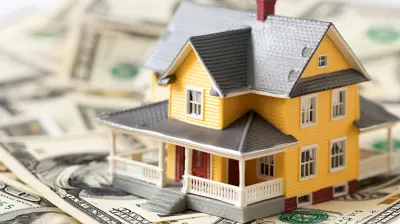Should You Renovate Before Selling? A Guide for First-Time Sellers
9 August 2025
Selling your home is a big decision, and if you're a first-time seller, the process can feel overwhelming. One of the biggest dilemmas homeowners face is whether to renovate before putting their property on the market. On one hand, updates could boost the home's value and attract more buyers. On the other, renovations can be time-consuming and expensive.
So, should you renovate before selling? Let’s break it down. 
Understanding Your Market
Before swinging that sledgehammer or investing in a kitchen overhaul, take a step back and analyze your local real estate market.- Is It a Buyer’s or Seller’s Market?
If it’s a seller’s market—where demand is high and inventory is low—you may not need major renovations to sell quickly and at a good price. If it’s a buyer’s market, where competition is fierce, upgrades might be necessary to stand out.
- What Do Local Buyers Want?
Not all renovations add value. Research what buyers in your area look for. Are they prioritizing modern kitchens, updated bathrooms, or energy-efficient features? Check out local listings to see what homes are selling fast and why. 
The Pros of Renovating Before Selling
1. Higher Selling Price
Upgraded homes typically appeal to more buyers and may command a higher price. A fresh coat of paint, upgraded flooring, or a modern kitchen can make a huge difference.2. Faster Sale
Move-in-ready homes sell faster. Buyers love properties that don’t require immediate repairs or renovations. If your home is outdated, it might sit on the market longer than you’d like.3. Better First Impressions
Curb appeal matters. A well-maintained home creates a strong first impression, making buyers more likely to put in an offer. Even small updates like landscaping, a new front door, or fresh paint can do wonders.4. Higher Return on Investment (ROI)
Certain renovations, particularly in kitchens and bathrooms, often yield high returns. But not all projects are worth the cost—more on that later.
The Cons of Renovating Before Selling
1. High Costs
Renovations can be expensive. A kitchen remodel alone can run tens of thousands of dollars. If you’re already tight on cash, major updates might not be the best move.2. Time-Consuming
Renovations take time, and time is money in real estate. The longer you take to list your home, the longer you’ll be paying mortgage and maintenance costs.3. No Guarantee of a Higher Offer
Not all upgrades guarantee a significant return. Some buyers might still want to make changes to suit their own style, no matter how beautifully you renovate.4. Stress and Hassle
Managing contractors, dealing with delays, and making countless decisions can be stressful. If you’re already juggling work, family, and moving plans, renovations might just add unnecessary headaches.
Renovations That Add Value (and Those That Don’t)
If you decide to renovate, focus on projects that offer the best return on investment.High-ROI Renovations
✅ Kitchen Updates: You don’t need a full remodel—painting cabinets, replacing hardware, and upgrading appliances can make a huge difference.✅ Bathroom Improvements: Minor upgrades like new fixtures, fresh caulk, and updated lighting can increase appeal without costing a fortune.
✅ Curb Appeal Enhancements: A new front door, fresh landscaping, and exterior paint can boost your home's attractiveness.
✅ Fresh Paint: A neutral color palette can make your home feel brighter, cleaner, and more inviting.
✅ Flooring Updates: Replacing old carpets or refinishing hardwood floors can yield a great return.
Renovations With Low ROI
🚫 Luxury Upgrades: High-end finishes might not pay off. Installing a $50,000 chef’s kitchen in a neighborhood where homes sell for $300,000 isn’t a wise investment.🚫 Swimming Pool: While a pool might seem enticing, it comes with maintenance costs that might turn off potential buyers.
🚫 Room Additions: Adding square footage can be costly and time-consuming, and it may not increase your home’s value enough to justify the expense.
🚫 Extensive Customization: Bold wallpaper, unique tile choices, or overly personalized decor can limit your pool of interested buyers.
Alternatives to Renovating
If a full renovation sounds like too much hassle, consider these easier (and cheaper) options:- Deep Cleaning: A spotless home feels fresh and inviting. Don’t underestimate the power of a professional deep clean.
- Decluttering & Staging: Removing excess furniture, organizing spaces, and staging key rooms can make the house look move-in ready.
- Minor Repairs: Fix leaky faucets, patch holes in walls, and replace outdated fixtures. Small details matter.
- Professional Photography: Great listing photos can make a huge difference in how many buyers show interest.
When Should You Sell As-Is?
Sometimes, selling "as-is" might be the better (and less stressful) option. Here are some scenarios when skipping renovations makes sense:- You Need to Sell Quickly: If relocating for a job or dealing with financial challenges, spending months on renovations might not be feasible.
- The Property Needs Major Repairs: If your home requires a new roof, foundation work, or extensive electrical updates, it may be better to lower the price and let the buyer handle renovations.
- You’re Selling to an Investor: Some buyers, especially flippers, specifically look for fixer-uppers and might prefer a home they can renovate themselves.
Final Verdict: Should You Renovate Before Selling?
The answer depends on your home’s condition, your budget, and your local market. If small, cost-effective upgrades can increase your home’s value and attract buyers, they’re worth considering. However, if extensive renovations are needed—or if you’re in a hot seller’s market—selling as-is might be the wiser choice.At the end of the day, the goal is to maximize profit while minimizing stress. Sometimes, a little paint and staging are all you need to make a great impression.
Key Takeaways
- Minor updates like fresh paint, new fixtures, and deep cleaning can help sell your home faster.- Not all renovations add value—focus on high-ROI improvements.
- If your home needs major repairs, selling as-is might be the best route.
- Your local market conditions should influence your decision.
Thinking of selling soon? Take a step back and weigh your options—because not every home needs a full makeover to fly off the market.
all images in this post were generated using AI tools
Category:
First Time SellersAuthor:

Cynthia Wilkins
Discussion
rate this article
1 comments
Theo Shaffer
Renovating before selling can enhance your property's appeal and potentially increase its value. Focus on key updates like kitchens and bathrooms, as they yield the highest returns. However, weigh costs against your market conditions and timeline to ensure a profitable sale. Prioritize smart, strategic improvements for the best results.
August 18, 2025 at 12:17 PM

Cynthia Wilkins
Absolutely! Key renovations, especially in kitchens and bathrooms, can boost appeal and value. Just be sure to balance costs with current market conditions for optimal results.


